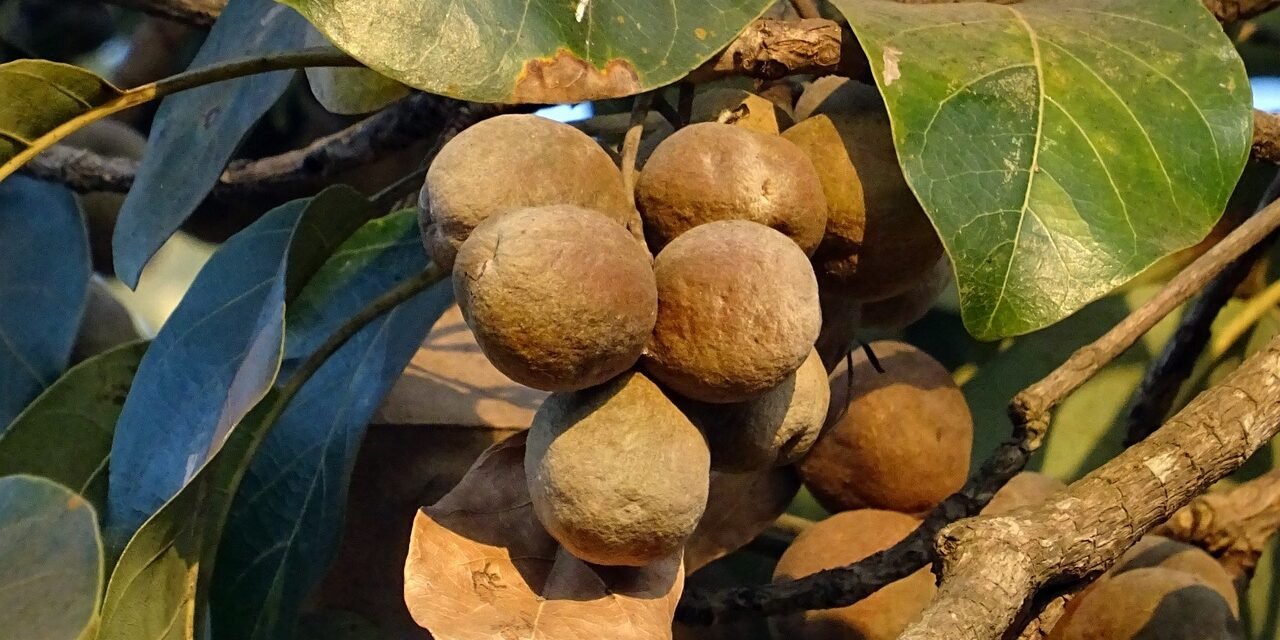Botanical Profile
- Scientific Name: Terminalia bellirica
- Common Names: Bibhitaki, Baheda, Indian Black Myrobalan
- Family: Combretaceae
- Plant Type: Deciduous tree
- Height: 15–30 meters
- Native Region: India, Sri Lanka, Bangladesh, and parts of Southeast Asia
- Cultivation: Grown in tropical and subtropical regions, commonly found in forests and hilly areas.
Plant Parts Used
- Fruit (Primary)
- Leaves
- Bark
- Seeds
Key Chemical Constituents
- Tannins: Ellagic acid, Chebulagic acid
- Flavonoids: Quercetin, Kaempferol
- Glycosides: Terminaloside
- Saponins: Betulinic acid
- Essential Oils: Terpenes, sesquiterpenes
- Acids: Gallic acid, Ellagic acid
Health Benefits
- Immunomodulatory: Boosts immune function, helps in combating infections.
- Antioxidant: Protects cells from oxidative damage due to the presence of polyphenolic compounds like ellagic acid.
- Anti-inflammatory: Reduces inflammation by inhibiting the action of pro-inflammatory enzymes.
- Digestive Health: Supports the digestive system, acts as a mild laxative, and aids in improving gut health.
- Respiratory Health: Helps in treating respiratory disorders like asthma, bronchitis, and cough by acting as an expectorant.
- Liver Health: Promotes detoxification, supports liver regeneration, and reduces liver damage.
- Weight Management: Assists in weight management by boosting metabolism and controlling appetite.
- Cardiovascular Health: Helps to regulate cholesterol levels, particularly reducing LDL cholesterol, and improves heart health.
- Skin Health: Provides protection against skin aging, supports wound healing, and promotes skin rejuvenation.
Traditional Uses
- Ayurvedic Formulations: Bibhitaki is an integral part of Triphala, a popular Ayurvedic remedy used for detoxification, rejuvenation, and digestive health.
- Culinary Uses: The dried fruit is used in various forms, including powders and extracts, often consumed with honey or in herbal teas.
- Hair Care: Bibhitaki is used to strengthen hair roots and prevent hair fall; it is commonly included in hair oils and treatments.
- Medicinal Pastes: The fruit is used in paste form to treat wounds and as a topical anti-inflammatory agent.
Pharmacological Actions
- Antioxidant Activity: Its polyphenolic compounds, including ellagic acid, exhibit strong antioxidant properties that protect cells from oxidative stress.
- Anti-inflammatory: Inhibits inflammatory pathways and reduces levels of pro-inflammatory cytokines.
- Gastroprotective: Helps soothe the stomach lining, reduces acid reflux, and can assist in managing ulcers.
- Hypolipidemic: Reduces total cholesterol, LDL cholesterol, and triglyceride levels in the blood.
- Hepatoprotective: Protects the liver from toxins, supports liver regeneration, and detoxifies harmful substances.
- Expectorant: Aids in the removal of excess mucus from the lungs, helping with conditions like asthma and bronchitis.
Scientific Studies & Research
- Anticancer: Studies show that Bibhitaki extracts exhibit potential anticancer properties by inducing apoptosis (cell death) in cancer cells.
- Blood Sugar Regulation: Some studies have shown that Bibhitaki can help regulate blood glucose levels, making it useful for managing type 2 diabetes.
- Neuroprotective: Preliminary research suggests Bibhitaki may protect against neurodegenerative diseases due to its antioxidant properties.
Precautions & Side Effects
Drug Interactions: Can interact with medications for diabetes or cholesterol, so it is recommended to monitor blood levels when using Bibhitaki alongside such medications.
Gastrointestinal Effects: Excessive consumption can lead to mild digestive issues such as bloating or diarrhea.
Pregnancy & Lactation: While generally considered safe, pregnant or breastfeeding women should consult with a healthcare provider before use.
Blood Pressure: Bibhitaki may have mild blood pressure-lowering effects; those on antihypertensive medications should use it cautiously.
Disclaimer: While we strive to provide accurate and up-to-date information, we cannot guarantee the completeness, reliability, or accuracy of the content. Information on this site is not a substitute for professional medical advice, diagnosis, or treatment. Always consult with a qualified healthcare provider before using herbs.



